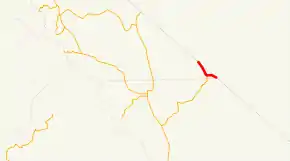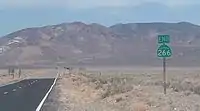California State Route 266
State Route 266 (SR 266) is a state highway in the U.S. state of California. The route traverses Fish Lake Valley, which is part in California and part in Nevada. The route connects two Nevada state routes that traverse the Nevada portion of the valley, NV 264 and NV 266. The only connection from SR 266 to the rest of California's road network is via SR 168 in the community of Oasis. Prior to 1986 the southern and northern halves of modern SR 266 had separate numerical designations. The southern portion of the highway, along with modern SR 168, dates to the auto trail era, forming part of the Midland Trail.
| ||||
|---|---|---|---|---|
 SR 266 highlighted in red | ||||
| Route information | ||||
| Defined by Streets and Highways Code § 566 | ||||
| Maintained by Caltrans | ||||
| Length | 11.721 mi[1] (18.863 km) | |||
| Major junctions | ||||
| South end | ||||
| North end | ||||
| Location | ||||
| Counties | Mono | |||
| Highway system | ||||
| ||||
Route description

State Route 266 begins at the western terminus of Nevada State Route 266 at the Nevada state line. The route travels west-northwest, then turns to the west for another 1.8 miles (2.9 km) before approaching Oasis, the only community that the route passes through. At Oasis, SR 266 intersects SR 168, which serves as the gateway into the Owens Valley from Nevada. Upon leaving Oasis, SR 266 continues to the west briefly, then turns north-northwest. Within the last 7 miles (11 km), SR 266 slowly curves northwest as the route approaches the Nevada state line. The route ends at the state line at the southern terminus of Nevada State Route 264. As the route has more connections to Nevada than the rest of California, Caltrans and the Nevada DOT have entered into a joint agreement on snow removal and other short term maintenance duties for the route.[2]
The section of SR 266 from the western terminus to the junction with SR 168 is designated by the California State Legislature as eligible by law for the State Scenic Highway System;[3] but it is not officially designated as a scenic highway by the California Department of Transportation.[4] The entire route, consisting of two lanes for two-way traffic, traverses on the flat land in the Fish Lake Valley east of the White Mountains, and it can serve as transportation of agricultural goods between California and Nevada via the route's only junction State Route 168. In the event that SR 168 is closed, SR 266 connects to Nevada State Route 264, which intersects with U.S. Route 6 in order to provide an alternate access to California.[2]
History
The southern half of modern SR 266 (from Oasis to Nevada State Route 266 near Lida, Nevada) predates the era of numbered highways and formed part of the Midland Trail, one of the first auto trails crossing the entire country.[5] Construction for a road from Oasis to the Nevada state line to be added to the State Highway System was authorized in 1931. This road was initially designated Legislative Route 63 and later signed as California State Route 168.[6][7] In 1965, route 266 was designated incorporating what is the northern half of modern SR 266 connecting with modern Nevada State Route 264, using the alignment of an existing Mono County road.[8] In 1986, the definition of SR 266 was extended to its modern form, with both termini at the Nevada state line, absorbing what was previously a portion of SR 168. With this change Nevada and California routes 266 connected at the state line.[2][9]
Major intersections
Except where prefixed with a letter, postmiles were measured on the road as it was in 1964, based on the alignment that existed at the time, and do not necessarily reflect current mileage. R reflects a realignment in the route since then, M indicates a second realignment, L refers an overlap due to a correction or change, and T indicates postmiles classified as temporary (for a full list of prefixes, see the list of postmile definitions).[1] Segments that remain unconstructed or have been relinquished to local control may be omitted. The entire route is in Mono County.
| Location | Postmile [1][10][11] | Destinations | Notes | ||
|---|---|---|---|---|---|
| | 0.00 | Continuation into Nevada; south end of SR 266 | |||
| Oasis | 4.30 | ||||
| | 11.72 | Continuation into Nevada; north end of SR 266 | |||
| 1.000 mi = 1.609 km; 1.000 km = 0.621 mi | |||||
See also
 California Roads portal
California Roads portal
References
- California Department of Transportation. "State Truck Route List". Sacramento: California Department of Transportation. Archived from the original (XLS file) on June 30, 2015. Retrieved June 30, 2015.
- "State Route 266 - Transportation Concept Report" (PDF). Caltrans. June 2008.
- "Article 2.5 of Chapter 2 of Division 1". California Streets & Highways Code. Sacramento: California Office of Legislative Counsel. Retrieved February 6, 2019.
- California Department of Transportation (August 2019). "Officially Designated State Scenic Highways and Historic Parkways" (XLSX). Sacramento: California Department of Transportation.
- Westgard, A.L. "Motor Routes to the California Expositions". Highway History. Federal Highway Administration. Retrieved June 25, 2012.
- California State Assembly. "An act establishing certain additional state highways and classifying them as secondary highways". Forty-ninth Session of the Legislature. Statutes of California. State of California. Ch. 82.
- "State Route 168 Transportation Concept Report" (PDF). California Department of Transportation. Retrieved 2012-01-30.
- California State Assembly. "An act... relating to state highway routes". 1965 Session of the Legislature. Statutes of California. State of California. Ch. 1875.
- California State Assembly. "An act to amend Sections 318, 341, 343, 360, 366, 370, 374, 388, 389, 403, 425, 468, 548, 624, 2104, and 2107 of, to add Section 632 to, and to repeal Sections 322.1, 355.1, 417, and 622.2 of, the Streets..." 1985–1986 Session of the Legislature. Statutes of California. State of California. Ch. 928 p. 3215–3216.
- California Department of Transportation (July 2007). "Log of Bridges on State Highways". Sacramento: California Department of Transportation. Retrieved February 10, 2008.
- "All Traffic Volumes on CSHS". California Department of Transportation. 2005–2006. Retrieved February 10, 2008.
External links
| Wikimedia Commons has media related to California State Route 266. |
